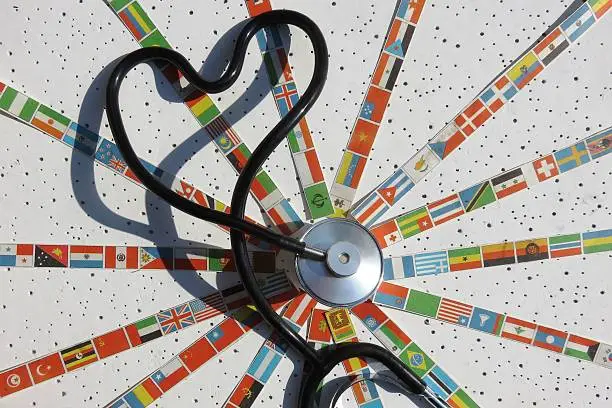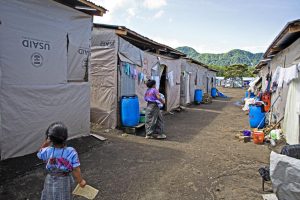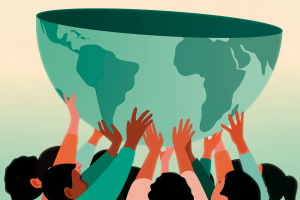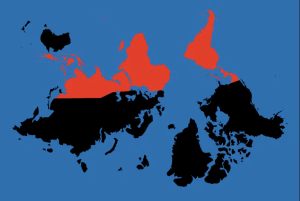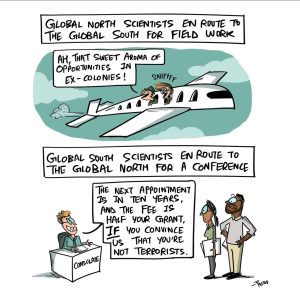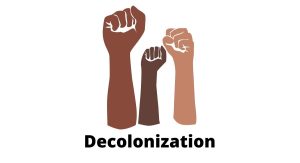What makes someone a global health professional- and who gets to decide? In this thought-provoking piece, Ojiako and Pai challenge the unequal ways the label “global health” is applied across geographies and professions. The authors expose how power, funding, and perception shape whose expertise counts. They argue that true global health transcends borders and titles and that all those working to advance health equity, wherever they are, are indeed global health professionals. Read the full article here
Category: Decolonization
Colonialism is a longstanding historical and social phenomenon as much as well as a mindset. Throughout the history of colonialism, neo-colonialism, and contemporary practices of global health assistance are the dominant relationships of power and privilege that are perpetuated by people and institutions of the global north toward those of the global south.
Global health is at a critical juncture: Will we let the moment pass by?
History shows that institutions often change not gradually but through sharp disruptions—critical junctures. These are moments of profound uncertainty and instability, when the usual path is interrupted and a new direction becomes possible—even mandatory. The choices made during such periods by countries, governments, and communities can set trajectories that last for decades. In January 2025, global health entered such a moment. Stop work orders were issued for PEPFAR-funded activities and other U.S. global health programs across multiple countries, abruptly halting…
Wake Up Call for and from the Global South
The withdrawal of U.S. foreign aid since the sudden freeze in January 2025 has underscored the need for a paradigm shift in global health, particularly in Africa, where communities have long been depicted as passive recipients of foreign assistance. Many people in Africa have played a crucial role in advancing HIV treatment, from early studies on antiretroviral therapy to recent innovations in long-acting injectable drugs for prevention. Despite their contributions, they are often the last to benefit from these advancements….
Moving Beyond Allyship in the Decolonization of Global Health
The University of Washington School of Public Health’s Alison Wiyeh, MD, MSc (PhD student in the Department of Epidemiology with a concentration in public policy and management) and Ferdinand Mukumbang, PhD, MS (Assistant Professor in the Department of Global Health) recently published a correspondence in The Lancet, “Global South leaders should strengthen strategic capacity“. The commentary describes the limitations of relying on Global North allyship in the decolonization of global health. Wiyeh and Mukumbang’s argument is particularly salient following current…
Decolonizing means disrupting global power dynamics
Since its beginnings, the field of global health has been structured by power dynamics which privilege the work of the Global North. Efforts to change this status quo have been incrementing as years go by. However, institutions and researchers from the Global South still face many systemic barriers. Both geopolitical hemispheres need to address this issue collaboratively to bring equity into the picture. In the article titled “Shifting power in global health will require leadership by the Global South and…
Power, Injustice & Exploitation are Key Elements of Global Health Colonialism
David McCoy, Anuj Kapilashrami and co-authors argue in the Bulletin of the WHO that an agenda for decolonization among global health practitioners must address the corporate and financialized power, injustice, exploitation, wealth extraction and profiteering that is widespread today. They present a three-part decolonization agenda for action to: 1) address the power asymmetries between global health actors from high-income & privileged countries and their counterparts in low-income and marginalized settings; 2) address colonization by the institutions, structures and systems of…
Visa Injustice: Silencing Critical Voices in Global Health
Global health practitioners and researchers from low- and middle-income countries face significant barriers due to restrictive visa policies. Many professionals are unable to attend international conferences, limiting their participation in critical discussions and collaborations. Consequently, global health events often become exclusive gatherings dominated by individuals from high-income countries, sidelining crucial voices from the global south. New research highlights this injustice, revealing that Pakistanis spent a staggering £ 5.3 million on rejected United Kingdom visas and € 3.3 million on denied…
Decolonizing must challenge globalized systems of wealth extraction and profiteering.
The authors of a February 2024 Bulletin of the World Health Organization article call for global health actors to challenge current forms of corporate and financialized colonialism that operate through globalized systems of wealth extraction and profiteering. They note that most of the current narrative on decolonization focuses on correcting power imbalances between health actors in high-income and low-income countries and on challenging ideas and values of some wealthy countries that shape the practice of global health. The authors of…
Rewriting the Script of Global Health
In the heart of Rwanda, a pharmaceutical revolution is unfolding, disrupting a global health order long dominated by high-income nations. This bold move by a nation determined to chart its own course in healthcare sovereignty embodies the spirit of decolonizing global health. It serves as a testament to the possibility of a world where equity in health is not just an aspirational goal but an actionable reality. This narrative of empowerment and systemic change ignites the conversation around decolonizing global…
Hollow Promises and True Adversaries
Decolonization in global health has gained popularity as a trendy topic, but the language of equity and justice falls short when it comes to practice. Richard Horton’s “Offline: The case for global health” (Lancet, May 2023) pushes us to struggle against deeper issues in our field, including power and money imbalances, unearned privileges, racism, and the omniscience to decide the narrative and tell the global south what it needs. While global health professionals engage in internal battles, the true adversaries…
